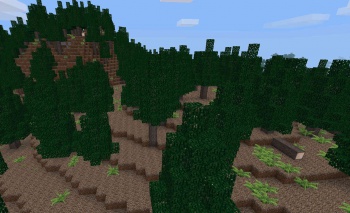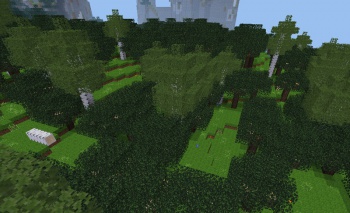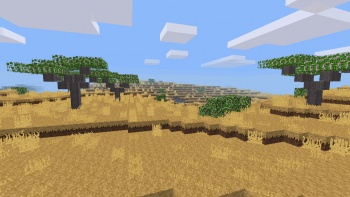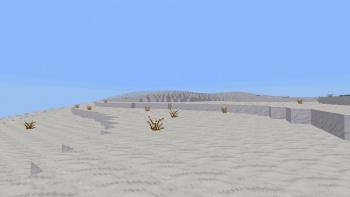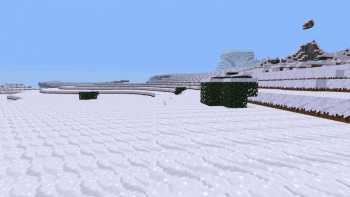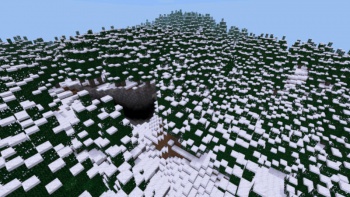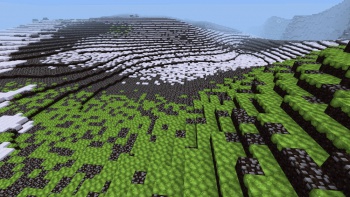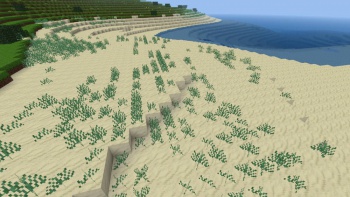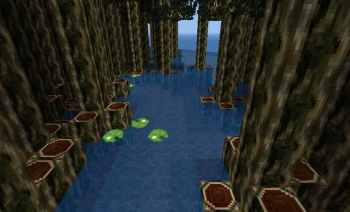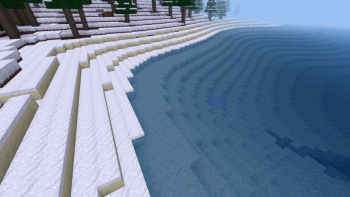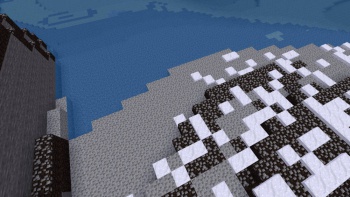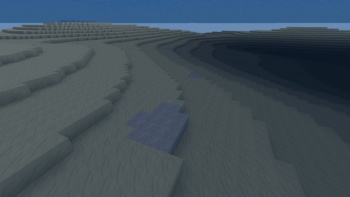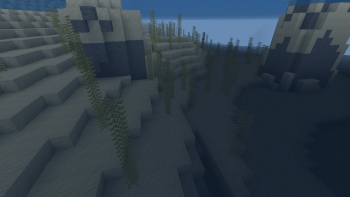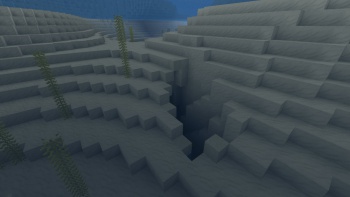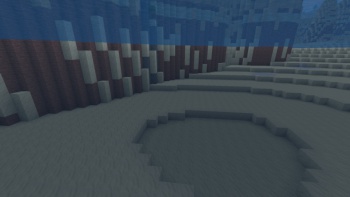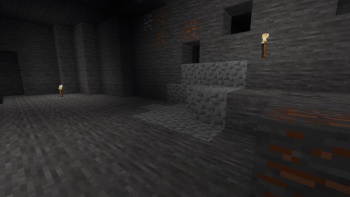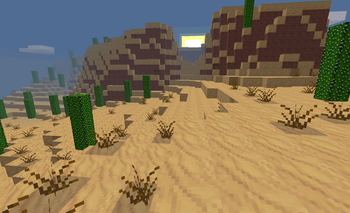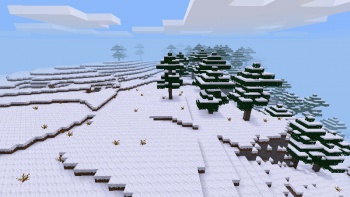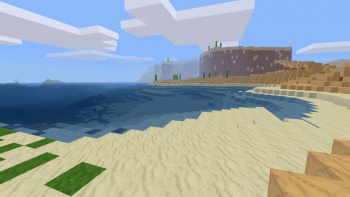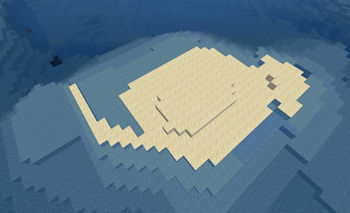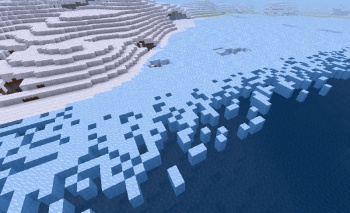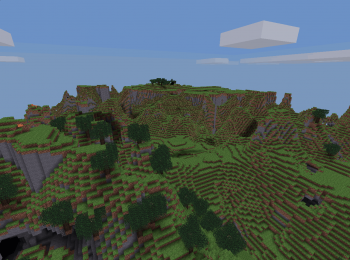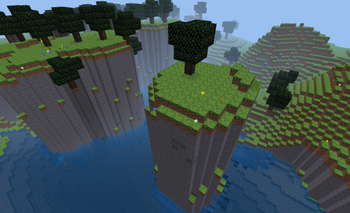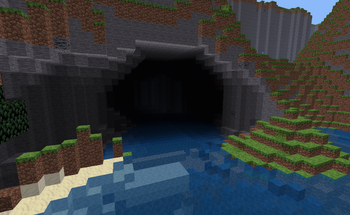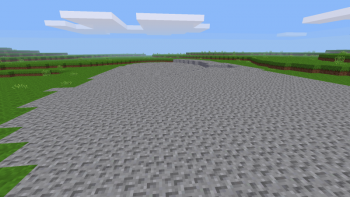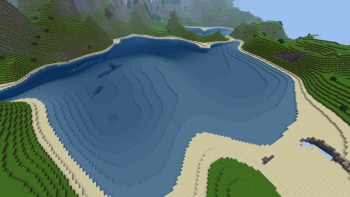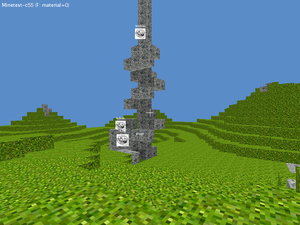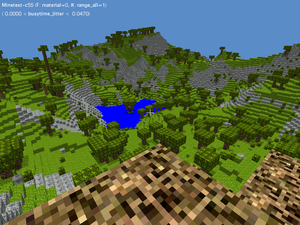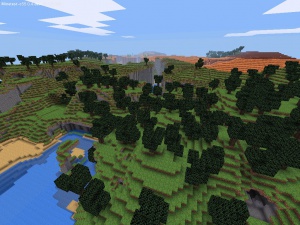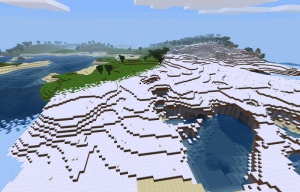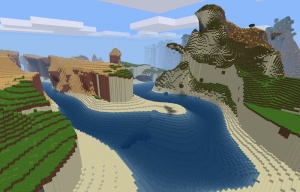Difference between revisions of "Biomes"
(→Main biomes: No mushrooms in v6 :-() |
(→History: rename Minetest to Luanti) |
||
| (126 intermediate revisions by 3 users not shown) | |||
| Line 1: | Line 1: | ||
{{Languages}} | {{Languages}} | ||
| − | Biomes in | + | Biomes in Luanti are a part of the [[Map generator|map generation]]. Biomes are areas with similar ground and underground and vegetation. |
== Biome types == | == Biome types == | ||
The biomes depend on the map generator used. Most map generators have the same biomes, but v6 is different. | The biomes depend on the map generator used. Most map generators have the same biomes, but v6 is different. | ||
| − | === v5, v7, valleys, flat, fractal === | + | '''Note''': Blocks written in bold in the “Blocks” column are the land surface blocks of this biome. |
| + | |||
| + | === v5, v7, valleys, carpathian, flat, fractal === | ||
Biomes in these map generators are defined by mods. If these are not defined, these map generators only generate [[stone]] worlds. Biomes in these map generators are not linked to the terrain shape; this means any biome (including grasslands) can form in flat or very mountainous areas. | Biomes in these map generators are defined by mods. If these are not defined, these map generators only generate [[stone]] worlds. Biomes in these map generators are not linked to the terrain shape; this means any biome (including grasslands) can form in flat or very mountainous areas. | ||
| − | This section shows the biomes used by [[ | + | This section shows the biomes used by [[Games/Minetest Game|Minetest Game]]. |
| + | |||
| + | ==== Land biomes ==== | ||
{| class="wikitable" | {| class="wikitable" | ||
| − | ! width=15%| | + | ! Name |
| + | ! width=15% | Blocks | ||
! Description | ! Description | ||
! width=355px|Images | ! width=355px|Images | ||
|- | |- | ||
| − | | '''Grassland''' | + | | '''Grassland''' |
| − | | Grassland has large amounts of [[Dirt]] nodes and [[Dirt with Grass]] blocks, on which [[Flower|flowers]], [[Grass]] and bushes may appear naturally in this area. The underground is made of [[stone]]. | + | | '''[[Dirt with Grass]]''', [[Dirt]], [[Stone]],<br/><br/>[[Grass]], [[Flower]], [[Bush Leaves]], [[Bush Stem]], [[Bush Leaves|Blueberry Bush Leaves]], [[Bush Leaves|Blueberry Bush Leaves with Berries]] |
| + | | Grassland has large amounts of [[Dirt]] nodes and [[Dirt with Grass]] blocks, on which [[Flower|flowers]], [[Grass]] and bushes (including blueberry bushes) may appear naturally in this area. The underground is made of [[stone]]. | ||
| [[File:Minetest_Game_plains_v7.jpg|thumb|350px|Grassland biome, as of 0.4.15]] | | [[File:Minetest_Game_plains_v7.jpg|thumb|350px|Grassland biome, as of 0.4.15]] | ||
|- | |- | ||
| − | | '''Coniferous forest''' | + | | '''Coniferous forest''' |
| − | | Coniferous forests grow in colder areas and are filled with pine trees. | + | | '''[[Dirt with Coniferous Litter]]''', [[Dirt]], [[Stone]],<br/><br/>[[Pine Tree]], [[Leaves|Pine Needles]], [[Fern]], [[Red Mushroom]], [[Brown Mushroom]] |
| − | | [[File:Pine forest.jpg|thumb|350px|Pine tree forest in 0. | + | | Coniferous forests grow in colder areas and are notable for their unique floor. They are filled with a dense vegetation of ferns and pine trees, which come in two different shapes: One with “square” canopies and a “pointy” one. Between the dense fern, occasional mushrooms can be found. Fallen pine tree logs (on which you can sometimes find a red mushroom) can be found as well. A similar biome is the ''taiga'' (see below). |
| + | | [[File:Pine forest.jpg|thumb|350px|The “pointy” pine trees in a Pine tree forest in 5.0.0.]] | ||
|- | |- | ||
| − | | '''Deciduous forest''' | + | | '''Deciduous forest''' |
| − | | Deciduous forests | + | | '''[[Dirt with Grass]]''', [[Dirt]], [[Stone]],<br/><br/>[[Apple Tree]], [[Leaves|Apple Tree Leaves]], [[Aspen Tree]], [[Leaves|Aspen Leaves]], [[Apple]], [[Flower]], [[Red Mushroom]], [[Brown Mushroom]], [[Bush Leaves]], [[Bush Stem]] |
| − | | [[File:Deciduous_forest_v7.jpg|thumb|350px|Forest with | + | | Deciduous forests form in temperate zones and are home to apple trees and aspen trees. Like in other forests, logs of fallen trees can be found here. Deciduous forests are frequently bordering surrounding grasslands. |
| + | | [[File:Deciduous_forest_v7.jpg|thumb|350px|Forest with apple and aspen trees in 0.4.15]] | ||
|- | |- | ||
| − | | '''Rainforest''' | + | | '''Rainforest''' |
| − | | Rainforests (or jungles) | + | | '''[[Dirt with Rainforest Litter]]''', [[Dirt]], [[Stone]],<br/><br/>[[Jungle Grass]], [[Jungle Tree]], [[Jungle Leaves]], [[Brown Mushroom]], [[Waterlily]] |
| − | | [[File:Minetest Game jungle v7.jpg|thumb|350px|Rainforest biome in v7 as of 0.4. | + | | Rainforests (or jungles) are made of large jungle trees which grow thickly packed together. [[Jungle Grass]] and [[Jungle Tree|Jungle Trees]] bearing [[Leaves|Jungle Leaves]] spawn here naturally. On fallen jungle tree logs, brown mushrooms may appear rarely. |
| + | | [[File:Minetest Game jungle v7.jpg|thumb|350px|Rainforest biome in v7 as of 0.4.16]] | ||
|- | |- | ||
| − | | '''Savanna''' | + | | '''Savanna''' |
| − | | The savanna is a dry land which is not a desert | + | | '''[[Savanna Dirt with Savanna Grass]]''', [[Savanna Dirt]], [[Stone]],<br/><br/>[[Savanna Grass]], [[Wild Cotton]], [[Acacia Tree]], [[Leaves|Acacia Leaves]], [[Bush Leaves|Acacia Bush Leaves]], [[Acacia Bush Stem]] |
| − | | [[File:Savannah.jpg|thumb|350px| | + | | The savanna is a dry land which is not a desert. It is populated with plenty of savanna grass and occasional acacia trees, acacia bushes and wild cotton. There are also a few fallen logs of acacia trees. |
| + | | [[File:Savannah.jpg|thumb|350px|Savanna in 0.4.16]] | ||
|- | |- | ||
| − | | '''Desert''' | + | | '''Desert''' |
| − | | Deserts contain large amounts of [[Desert Sand|desert sand]] and [[Desert Stone|desert stone]]. [[Cactus|Cacti]] and [[Dry Shrub|dry shrubs]] also | + | | '''[[Desert Sand]]''', [[Desert Stone]], [[Sandstone]], [[Desert Sandstone]], [[Sand]]<br/><br/>[[Cactus]], [[Dry Shrub]] |
| − | | [[File:Minetest Game desert.jpg|thumb|350px|Desert biome in v7, as of | + | | Deserts contain large amounts of [[Desert Sand|desert sand]] and [[Desert Stone|desert stone]]. In the desert stone, there are continuous strata of sandstone and desert sandstone that extend throughout the world. Small blobs of sand might be found in the desert stone as well. [[Cactus|Cacti]] and [[Dry Shrub|dry shrubs]] also grow here naturally on desert sand. Cacti can form in two different shapes. |
| + | |||
| + | Deserts form in hot and dry areas. | ||
| + | | [[File:Minetest Game desert.jpg|thumb|350px|Desert biome in v7, as of 5.5.1]] | ||
|- | |- | ||
| − | | '''Sandstone desert''' | + | | '''Sandstone desert''' |
| + | | '''[[Sand]]''', [[Sandstone]],<br/><br/>[[Dry Shrub]] | ||
| Sandstone deserts are large barren areas covered by [[Sand|sand]] with [[sandstone]] below. They form in temperate and dry climates. | | Sandstone deserts are large barren areas covered by [[Sand|sand]] with [[sandstone]] below. They form in temperate and dry climates. | ||
| [[File:Minetest Game sandstone desert.jpg|thumb|350px|Sandstone desert, as of 0.4.15]] | | [[File:Minetest Game sandstone desert.jpg|thumb|350px|Sandstone desert, as of 0.4.15]] | ||
|- | |- | ||
| − | | '''Cold desert''' | + | | '''Cold desert''' |
| − | | Cold deserts are large barren areas covered by large amounts of [[Silver Sand|silver sand]] on top of [[stone]]. | + | | '''[[Silver Sand]]''', [[Stone]], [[Silver Sandstone]]<br/><br/>[[Dry Shrub]] |
| + | | Cold deserts are large barren areas covered by large amounts of [[Silver Sand|silver sand]] on top of [[stone]]. In the stone, there's a continuous stratum of silver sandstone that extends throughout the world. | ||
| + | |||
| + | This biome forms in cold and dry areas. | ||
| [[File:Minetest Game cold desert.jpg|thumb|350px|A cold desert, as of 0.4.15]] | | [[File:Minetest Game cold desert.jpg|thumb|350px|A cold desert, as of 0.4.15]] | ||
|- | |- | ||
| − | | '''Snowy grassland''' | + | | '''Snowy grassland''' |
| + | | '''[[Snow]]''', [[Dirt with Snow]], [[Dirt]], [[Stone]],<br/><br/>[[Bush Leaves]], [[Bush Stem]] | ||
| The snowy grassland biome usually borders grasslands and is completely covered by a thin layer [[snow]] on top of [[Dirt with Snow|dirt with snow]]. A few snow-covered bushes can be found here. | | The snowy grassland biome usually borders grasslands and is completely covered by a thin layer [[snow]] on top of [[Dirt with Snow|dirt with snow]]. A few snow-covered bushes can be found here. | ||
| [[File:Snow biome.jpg|thumb|350px|Snowy grassland, as of 0.4.15]] | | [[File:Snow biome.jpg|thumb|350px|Snowy grassland, as of 0.4.15]] | ||
|- | |- | ||
| − | | '''Taiga''' | + | | '''Taiga''' |
| − | | Taigas are cold snow-covered biomes with rich vegetation with [[snow]] and [[Dirt with Snow|dirt with snow]] as surface. They are populated with snow-covered pine trees. | + | | '''[[Snow]]''', '''[[Dirt with Snow]]''', [[Dirt]], [[Stone]],<br/><br/>[[Pine Tree]], [[Leaves|Pine Needles]], [[Pine Bush Stem]], [[Bush Leaves|Pine Bush Needles]], [[Dry Shrub]], [[Red Mushroom]] |
| − | | [[File:Minetest Game taiga.jpg|thumb|350px| | + | | Taigas are cold snow-covered biomes with rich vegetation with [[snow]] and [[Dirt with Snow|dirt with snow]] as surface. They are populated with snow-covered pine trees and pine bushes. Like in the coniferous forest, the pine trees grow in two different shapes. On fallen pine tree logs, red mushrooms can sometimes be found. |
| + | | [[File:Minetest Game taiga.jpg|thumb|350px|“Pointy” pine trees in a taiga, as of 5.0.0]] | ||
|- | |- | ||
| − | | '''Tundra'''<br/>[[ | + | | '''Tundra''' |
| − | | Tundras are barren biomes in very cold climates with no vegetation and a single layer of [[Snow Block|snow blocks]] on top of [[stone]]. They are usually found between taigas, snowy | + | | '''[[Snow Block]]''', [[Stone]],<br/>''[[Ice]]''<ref name="valleys_only">This block is only generated in the valleys mapgen</ref>, ''[[Gravel]]''<ref name="valleys_only"/> |
| − | | [[File:Minetest Game tundra.jpg|thumb|350px|Tundra in 0. | + | | Tundras are barren biomes in very cold climates with no vegetation and a single layer of [[Snow Block|snow blocks]] on top of [[stone]]. They are usually found between taigas, snowy grasslands and glaciers. This is one of the few biomes where snow blocks (rather than just snow) naturally occur. |
| + | |||
| + | In the valleys mapgen, the rivers are frozen and made out of [[ice]] but they may be tricky to find because they are often buried below the snow blocks. Below the ice you can find a riverbed of [[gravel]]. | ||
| + | | [[File:Minetest Game tundra.jpg|thumb|350px|Tundra in 5.0.0]] | ||
|- | |- | ||
| − | | ''' | + | | '''Ice Sheet''' |
| − | | | + | | '''[[Snow Block]]''', [[Ice]],<br/>''[[Gravel]]''<ref name="valleys_only"/> |
| − | | [[File:Glacier.jpg|thumb|350px|A large glacier formation, bordered by a | + | | The ice sheet biome forms only in the coldest regions and is made of large amounts of ice, covered by a thick layer of snow blocks without any vegetation. Ice sheet biomes can be either mountain-like, forming large glaciers as in the screenshot or very flat, creating large empty snow fields. |
| + | |||
| + | In the valleys mapgen, ice sheet biomes have frozen rivers like in tundras. | ||
| + | | [[File:Glacier.jpg|thumb|350px|A large glacier formation, bordered by a taiga, as of 0.4.13]] | ||
| + | |} | ||
| + | |||
| + | ==== Beach, shore and dune biomes ==== | ||
| + | These biomes form between land biomes and ocean biomes. | ||
| + | |||
| + | {| class="wikitable" | ||
| + | ! Name | ||
| + | ! width=15% | Blocks | ||
| + | ! Description | ||
| + | ! width=355px|Images | ||
|- | |- | ||
| − | | ''' | + | | '''Grassland dunes''', '''Coniferous forest dunes''' |
| − | | | + | | '''[[Sand]]''',<br/><br/>[[Marram Grass]] |
| − | | [[File:Minetest Game | + | | Dunes are made of sand on which occasional marram grass grows. They form at 3-4 blocks above sea level and border grasslands and coniferous forests. |
| + | | [[File:Minetest Game grassland dunes.jpg|thumb|350px|Grassland dunes in 5.0.0]] | ||
|- | |- | ||
| + | | '''Deciduous forest shore''' | ||
| + | | [[Water]], '''[[Dirt]]''',<br/><br/>[[Waterlily]] | ||
| + | | A deciduous forest shore is the area exactly at sea level bordering deciduous forest biomes and has dirt as its floor (instead of sand). In the shallow water there is a chance to find waterlilies. | ||
| + | | [[File:Minetest Game forest shore.jpg|thumb|350px|Deciduous forest shore in 5.0.0]] | ||
| + | |- | ||
| + | | '''Rainforest swamp''' | ||
| + | | [[Water]], '''[[Dirt]]''',<br/><br/>[[Jungle Tree]], [[Jungle Leaves]], [[Waterlily]] | ||
| + | | A rainforest swamp is a small biome which only forms at sea level next to a rainforest. Rainforest swamps have jungle trees like the rainforest, but their roots are flooded with water. [[Waterlily|Waterlilies]] may occur here on shallow water. | ||
| + | | [[File:Minetest Game jungle swamp.jpg|thumb|350px|Rainforest swamp biome as of 0.4.15]] | ||
| + | |- | ||
| + | | '''Savanna shore''' | ||
| + | | [[Water]], '''[[Dirt]]''',<br/><br/>[[Papyrus]], [[Waterlily]] | ||
| + | | Savanna shores are usually small areas of shallow water with a dirt floor. They occur when a savanna reaches the sea level. There are plenty of [[Papyrus|papyri]] growing on single dirt blocks, but it is the only place in which papyri occur naturally. A couple of [[Waterlily|waterlilies]] may be found on the shallow water as well. | ||
| + | | [[File:Minetest Game savanna shore v7.jpg|thumb|350px|Savanna shore in 5.0.0]] | ||
| + | |- | ||
| + | | '''Taiga beach''' | ||
| + | | [[Water]], '''[[Snow]]''', [[Sand]] | ||
| + | | When a taiga meets the ocean, it creates sand beaches that are covered with sand. | ||
| + | | [[File:Minetest Game taiga beach.jpg|thumb|350px|Taiga beach in 5.0.0]] | ||
| + | |- | ||
| + | | '''Tundra beach''' | ||
| + | | [[Water]], [[Snow]], '''[[Gravel]]''' | ||
| + | | A tundra beach consists of lots of gravel with occasional snow and may form when a tundra meets the ocean. | ||
| + | | [[File:Minetest Game tundra beach.jpg|thumb|350px|Tundra beach in 5.0.0]] | ||
|} | |} | ||
| − | === | + | ==== Ocean biomes ==== |
| − | + | Oceans are large bodies of water and have [[sand]] as the sea floor with occasional patches of [[clay]]. There are several ocean biomes in Minetest Game, one for each land biome. Each ocean biome has the same temperature and humidity requirements as its land counterpart. | |
| + | |||
| + | The defining feature of the ocean biomes are, of course, the oceans, but they actually extend way below the ocean floor of most oceans, down to the Underground biome (see below). So ocean biomes also affect the appearance of the underground. | ||
| − | |||
{| class="wikitable" | {| class="wikitable" | ||
| − | ! width=15%| | + | ! Name |
| + | ! width=15% | Blocks | ||
! Description | ! Description | ||
! width=355px|Images | ! width=355px|Images | ||
|- | |- | ||
| − | | ''' | + | | '''Tundra ocean''' |
| − | | | + | | [[Water]], '''[[Sand]]''', [[Clay]], [[Stone]], [[Ores]] |
| − | | [[File: | + | | The tundra ocean is the ocean biome that corresponds to the tundra. It could be seen as the “stereotypical” ocean biome, as the other ocean biomes share have most of the properties as this one. It has sand as the ocean floor, on top of stone. Like in all ocean biomes, blobs of clay are common inside the sand and occur between levels Y=0 and Y=-15. Ores generate in the stone. |
| + | | [[File:Ocean.jpg|thumb|350px|A typical ocean in 5.0.0]] | ||
|- | |- | ||
| − | | ''' | + | | '''Taiga ocean''', '''snowy grassland ocean''', '''grassland ocean''', '''coniferous forest ocean''', '''deciduous forest ocean''', '''cold desert ocean''' |
| − | | | + | | [[Water]], '''[[Sand]]''', [[Clay]], [[Stone]], [[Ores]]<br/><br/>[[Kelp]] |
| − | | [[File: | + | | Like the tundra ocean, but on the sand there grow occasional kelp. |
| + | | [[File:Minetest Game ocean with kelp.jpg|thumb|350px|Ocean with kelp in 5.0.0]] | ||
|- | |- | ||
| − | | ''' | + | | '''Sandstone desert ocean''' |
| − | + | | [[Water]], '''[[Sand]]''', [[Clay]], [[Sandstone]]<br/><br/>[[Kelp]] | |
| − | | [[File: | + | | Ocean pendant of the sandstone desert. Like above, but it has sandstone instead of stone as underground material. Kelp grows here in the same manner. |
| + | | [[File:Minetest Game sandstone desert ocean.jpg|thumb|350px|Sandstone desert ocean in 5.0.0]] | ||
|- | |- | ||
| − | | ''' | + | | '''Savanna ocean''', '''Rainforest ocean''' |
| − | + | | [[Water]], '''[[Sand]]''', [[Clay]], [[Stone]], [[Ores]]<br/><br/>[[Coral (block)]], [[Coral (rooted)]], [[Coral Skeleton]] | |
| − | | [[File: | + | | Savanna and rainforest oceans are the oceans bordering savannas and rainforests, respectively. Colorful [[coral]] reefs can form in the water close to the surface with all species of coral packed closely together. |
| + | || [[File:Minetest Game rainforest savannah ocean.jpg|thumb|350px|A coral reef in 5.0.0]] | ||
|- | |- | ||
| − | | ''' | + | | '''Desert ocean''' |
| − | | The | + | | [[Water]], '''[[Sand]]''', [[Clay]], [[Desert Stone]],<br/><br/>[[Coral]], [[Coral Skeleton]] |
| − | | [[File: | + | | Ocean variant of the desert. The underground material is desert stone. [[Coral]] reefs can form in the water close to the surface, in the same way as in savanna and rainforest oceans. |
| + | | [[File:Minetest Game desert ocean.jpg|thumb|350px|Desert ocean in 5.0.0]]. | ||
|- | |- | ||
| − | | ''' | + | | '''Ice sheet ocean''' |
| − | | | + | | [[Snow Block]], [[Ice]], [[Water]], '''[[Sand]]''', [[Clay]] |
| − | | [[File: | + | | Ice sheet ocean is the ocean pendant to the ice sheet biome (at land) and thus forms only in the coldest regions of oceans. This biome is named after the tall ice sheet that covers the ocean. The ice sheets are quite tall and consist of a single layer of snow blocks with up to 10 layers of ice beneath, “floating” above water in deep oceans. Shallow oceans and lakes might even be completely frozen. The underground below is either made out of ice or stone, creating interesting ice caves sometimes. |
| + | | [[File:Minetest Game ice sheet.jpg|thumb|350px|Ice sheet in 0.4.15]] [[File:Minetest Game icesheet cave.jpg|thumb|350px|Caves in this biome might have these odd ice cubes at the walls (5.0.0)]] | ||
|- | |- | ||
| − | | | + | |} |
| − | | | + | |
| − | | | + | ==== Underground biomes ==== |
| + | This refers to the part of the world that is at or below Y [[Coordinates|coordinate]] -255 (directly below the ocean biomes) and it extends all the way to the [[World boundaries|bottom of the world]], although most players would consider “the Underground” to be everything below sea level. Note the ocean biomes go very deep into the underground as well. | ||
| + | |||
| + | And indeed, most features of the underground biome, like ores, can be found in higher places as well. | ||
| + | {| class="wikitable" | ||
| + | ! Name | ||
| + | ! width=15% | Blocks | ||
| + | ! Description | ||
| + | ! width=355px|Images | ||
|- | |- | ||
| − | | ''' | + | | Underground |
| − | | | + | | '''Stone''', [[Air]], [[Silver Sand]], [[Dirt]], [[Gravel]], [[Water]], [[Lava]], [[Ores]] |
| − | + | | This is a technical biome in Minetest Game and the only underground biome. It is almost exclusively made of [[stone]], with occasional caves. There are occasional underground lakes of [[water]] and [[lava]], making underground exploration slightly dangerous. Smaller blobs of silver sand (but ''not'' ordinary sand!), dirt and gravel can be found all around the underground, but these are common everywhere where stone can be found. | |
| + | |||
| + | Since the underground is made out of stone, all the [[ores]] can be found here (although the ores are not restricted to this biome, in fact, they happily generate wherever stone can be found). The deeper you go, the more precious they become. | ||
| + | Most of the time, the caves in the underground biome are indistinguishable from most caves in the ocean biomes, because of all the stone. This is not true for all ocean biomes. A transition from “ocean biome” to underground becomes obvious when you you started digging in a biome that doesn't have the (normal) stone, like the desert or sandstone desert biomes. In that case, the transition from the ocean biomes to the underground biomes is very visible, as can be seen in the screenshot to the right. Another sure sign that you're in an ocean biome, not the underground biome (yet) are clusters of (normal) sand, which don't exist in the underground biome. This is an oddity of the map generator which placed the ocean floor material inside a cave somehow. | ||
| + | | [[File:Minetest Game underground.jpg|thumb|350px|Inside an underground cave with some iron ore, tin ore and a blob of gravel]] [[File:Minetest_Game_desert_ocean_underground_transition.jpg|thumb|350px|Transition from the biome “desert ocean” (with desert stone) to the biome “underground” (with normal stone)]] | ||
|} | |} | ||
| − | ==== | + | === v6 === |
| + | Biomes in v6 are rather simple, but there are some unique features not found in other mapgens. This mapgen has a few biomes and 3 [[Trees|tree]] species. In, v6, the biomes '''do''' determine the terrain shape to some extent. | ||
| + | |||
| + | In Minetest Game, some [[blocks]] are not generated at all, but nothing essential. For example, there are are no [[Aspen Tree|aspen trees]], [[Acacia Tree|acacia tree]] and [[Coral|corals]]. | ||
| + | |||
| + | Technically, the v6 map generator has a predefined set of biomes which can't be changed by mods directly. The outcome in different games will generally be very similar. Games usually only ''add'' to the v6 mapgen by creating so-called decorations, for example [[Flower|flowers]] and [[Grass|grass]]. | ||
| + | |||
| + | The distribution of v6 biomes can be seen here: [[:File:Biomes_v6.png]]. | ||
| + | |||
| + | ==== Biomes ==== | ||
| + | {| class="wikitable" | ||
| + | ! Name | ||
| + | ! Main Blocks<ref>Blocks generated by the core v6 mapgen</ref> | ||
| + | ! Decorations<ref>Additional blocks added by Minetest Game, can be controlled with the map generator flag <code>decorations</code>. See also: [[Map generator features#Shared features]]</ref> | ||
| + | ! Description | ||
| + | ! width=355px|Images | ||
| + | |- | ||
| + | | '''Temperate''' | ||
| + | | '''[[Dirt with Grass]]''', [[Dirt]], [[Stone]],<br/><br/>[[Apple Tree]], [[Leaves|Apple Tree Leaves]], [[Apple]] | ||
| + | | [[Grass]], [[Flower]], [[Brown Mushroom]], [[Red Mushroom]], [[Butterfly]], [[Firefly]] | ||
| + | | The Temperate biome (internally known as “Normal”) is the most common biome in v6 and forms in areas of medium heat. It includes grassy plains and apple tree forests. This biome is rather flat and covered by Dirt with Grass. The plains are large expanses of land. | ||
| + | In Minetest Game, Grass and flowers are spread over the entire biome; mushrooms may grow next to the apple tree trunks. | ||
| + | | [[File:Large plains.png|thumb|350px|Plains, as of 5.0.0]] | ||
| + | [[File:Mapgen_v6_forest.png|thumb|350px|A forest of apple trees in 5.0.0]] | ||
| + | |- | ||
| + | | '''Desert''' | ||
| + | | '''[[Desert Sand]]''', '''[[Desert Stone]]''' | ||
| + | | [[Cactus]], [[Dry Shrub]] | ||
| + | | Deserts hot and dry. They contain large amounts of [[Desert Sand|desert sand]] and [[Desert Stone|desert stone]] and often form large cliffs or canyons. Deserts are normally covered in desert sand, but at a few cliffs, the bare desert stone may be exposed without desert sand on top. Deserts spawn underground rivers and lakes which can be over 200 blocks deep. | ||
| + | In Minetest Game, [[Cactus|Cacti]] and [[Dry Shrub|dry shrubs]] also occur here naturally in clusters on desert sand. The cacti form in a “column” shape of up to 4 blocks high. | ||
| + | | [[File:Desert at sunset 0.4.7.png|thumb|350px|Desert biome, as of 0.4.7]] | ||
| + | |- | ||
| + | | '''Jungle''' | ||
| + | | '''[[Dirt with Grass]]''', [[Dirt]], [[Stone]],<br/><br/>[[Jungle Tree]], [[Jungle Leaves]], [[Jungle Grass]] | ||
| + | | [[Flower]], [[Grass]], [[Butterfly]], [[Firefly]] | ||
| + | | Jungles hot and humid. They contain large jungle trees which grow thickly packed together. [[Jungle Grass]] and [[Jungle Tree|Jungle Trees]] bearing [[Leaves|Jungle Leaves]] spawn here naturally. | ||
| + | In Minetest Game, flowers and Grass might appear here, but only rarely so, the jungle grass generally dominates in jungles. | ||
| + | | [[File:Jungle v6.jpg|thumb|350px|Jungle biome as of 0.4.16]] | ||
| + | |- | ||
| + | | '''Taiga''' | ||
| + | | '''[[Dirt with Snow]]''', [[Stone]],<br/><br/>[[Snow]], [[Pine Tree]], [[Leaves|Pine Needles]] | ||
| + | | [[Dry Shrub]] | ||
| + | | Taigas are cold and humid. The surface is covered with [[Dirt with Snow]] on top of [[Dirt]] or [[Stone]]. This biome includes snowed plains and [[snow]]-covered [[Pine Tree]] forests. In Minetest Game, some [[Dry Shrub]]s can be found here. | ||
| + | | [[File:Mapgen v6 taiga.jpg|thumb|350px|Both features of a taiga biome: To the left snowy plains with dry shrubs, to the right a pine tree forest (5.0.0)]] | ||
| + | |- | ||
| + | | '''Tundra''' | ||
| + | | '''[[Snow Block]]''', [[Dirt with Snow]], [[Stone]] | ||
| + | | | ||
| + | | Tundras are cold and dry. They have large open fields with a surface of [[Snow Block]]s on top of [[Dirt with Snow]]. There isn't any vegetation. They are essentially cold deserts. | ||
| + | | [[File:Mapgen v6 tundra.jpg|thumb|350px|Tundra biome in 5.0.0]] | ||
| + | |} | ||
| + | |||
| + | <references /> | ||
| + | |||
| + | ==== Landscape features ==== | ||
| + | Landscape features form (more or less) separately from biomes. | ||
| + | |||
{| class="wikitable" | {| class="wikitable" | ||
| − | ! | + | ! Name |
| + | ! Blocks | ||
! Description | ! Description | ||
! width=355px|Images | ! width=355px|Images | ||
|- | |- | ||
| − | | ''' | + | | '''Sand beach''' |
| − | | | + | | [[Water]], '''[[Sand]]''', ''[[Clay]]'', [[Stone]] |
| + | | Sand beaches are made out of [[sand]] and form at at [[Coordinates|height]] of Y=2 and below, which is near the sea level by default. Sand beaches often extend deep into the ocean, which can easily turn a large part of the ocean floor into sand. The sand replaces the floor of other biomes. Depending on the terrain shape, sand beaches can be short or very long and wide (as seen in the screenshot). [[Clay]] can be found in the sand and forms in small to medium-sized “blobs” underwater (Technically, clay is generated like an [[Ores|ore]] by Minetest Game). | ||
| − | + | Sand beaches are generated based on height and Perlin noise; they technically form independent of the water of oceans. This effect can be noted if the water level (with the setting <code>water_level</code>) has been reduced. | |
| − | | [[File:Mapgen_v6_beach.jpg|thumb|350px|A beach bordering a desert in 0.4.15]] | + | | [[File:Mapgen_v6_beach.jpg|thumb|350px|A sand beach bordering a desert in 0.4.15]] |
|- | |- | ||
| − | | '''Ocean''' | + | | '''Ocean''' |
| − | | | + | | [[Water]], [[Stone]], '''[[Dirt]]''', '''[[Sand]]''' |
| + | | An ocean is just a large body of water that reach a depth of around 25 blocks with the water surface at Y=0 worldwide (by default). The natural ocean floor is [[dirt]] (which is different from the other mapgens), but [[sand]] is also common because of sand beaches. Oceans usually spread across 250-300 blocks, but this can vary greatly. Oceans are a landscape feature that seemed to be implemented around [[Version History|0.2.20110731_1 Pre-Alpha]]. | ||
| [[File:Mapgen v6 ocean.jpg|thumb|350px|A large ocean in 0.4.15]] | | [[File:Mapgen v6 ocean.jpg|thumb|350px|A large ocean in 0.4.15]] | ||
| − | |||
|- | |- | ||
| − | | '''Island''' | + | | '''Island''' |
| − | | | + | | ''All blocks from the v6 biomes'', [[Water]] |
| + | | Islands occur many times in oceans. Islands usually raise out of the ground 3-10 blocks, but can get as large as 40-80 blocks tall. | ||
| [[File:Island 0.4.7.jpg|thumb|350px|A small beach-style island, as of 0.4.7]] | | [[File:Island 0.4.7.jpg|thumb|350px|A small beach-style island, as of 0.4.7]] | ||
|- | |- | ||
| − | | '''Mountain''' | + | | '''Ice sheet''' |
| − | | Mountains are the most treacherous to scale. Trees | + | | [[Ice]], [[Water]], '''[[Dirt]]''', '''[[Sand]]''' |
| + | | Ice sheets are two layers of [[ice]] on top of ocean water. They generate when a tundra biome hits an ocean. | ||
| + | | [[File:Ice_sheet_v6.jpg|thumb|350px|Ice sheet in 5.0.0]] | ||
| + | |- | ||
| + | | '''Mountain''' | ||
| + | | ''Blocks are similar to those of forests and plains'' | ||
| + | | Mountains are the most treacherous to scale. Trees grow here naturally. It is quite easy to be killed in a mountain landscape if you don't pay attention to where you are going. | ||
| [[File:Mountain.png|thumb|350px|Mountains, before 0.4.7]] | | [[File:Mountain.png|thumb|350px|Mountains, before 0.4.7]] | ||
|- | |- | ||
| − | | '''Plateau''' | + | | '''Plateau''' |
| − | | A giant structure that seems to | + | | ''Almost all blocks from the v6 biomes'' |
| + | | A giant structure that seems to have appeared from version 0.4 on, plateaus are very common in deserts but also in mountainous terrain. Plateaus can even float above ground and generate miniature biomes on top of it. | ||
| [[File:Plateau 0.4.7 alternative.png|thumb|350px|A plateau, as of 0.4.7]] | | [[File:Plateau 0.4.7 alternative.png|thumb|350px|A plateau, as of 0.4.7]] | ||
| − | |||
|- | |- | ||
| − | | '''Water | + | | '''Water cave''' |
| − | | Water caves are caves that only occur at sea level, which turn into a huge underground river or lake. | + | | [[Water]], '''[[Stone]]''' |
| + | | Water caves are caves that only occur at sea level, which turn into a huge underground river or lake. In extreme cases, these caves can lead thousands of blocks down and are extremely easily to get lost in. | ||
| [[File:Water cave 0.4.7_alternative.png|thumb|350px|A water cave, as of 0.4.7]] | | [[File:Water cave 0.4.7_alternative.png|thumb|350px|A water cave, as of 0.4.7]] | ||
| + | |- | ||
| + | | '''Gravel field''' | ||
| + | | '''[[Gravel]]''' | ||
| + | | Very rarely, unusually large [[Gravel|gravel]] fields can appear on the surface. These areas consist of nothing but gravel. A gravel field can occour in any biome and simply replaced the surface material (e.g. dirt with grass) with gravel. | ||
| + | | [[File:Mapgen_v6_gravel_biome.png|thumb|350px|A gravel field in 0.4.15]] | ||
| + | |} | ||
| + | |||
| + | === v7 === | ||
| + | ==== Floatland biomes (EXPERIMENTAL) ==== | ||
| + | Floatlands is an experimental [[Map generator features|feature]] of the v7 map generator. They are disabled by default. To use them, they have to be enabled with the setting <code>mgv7_spflags</code> first. | ||
| + | |||
| + | Floatlands are floating pieces of land that float way above the ground level (Y=1280 by default). Like on ground level, there are various terrain shapes, like flat lands and huge mountains. | ||
| + | |||
| + | In Minetest Game, the floatlands have 3 simple biomes, as of 5.0.0. This might change in future versions. Also, all ores can be found in the floatlands frequently, they are often exposed at the bare terrain. But it's quite a hassle to go all the way up to the floatlands to reach them. | ||
| + | {| class="wikitable" | ||
| + | ! Name | ||
| + | ! width=15% | Blocks | ||
| + | ! Description | ||
| + | ! width=355px|Images | ||
| + | |- | ||
| + | | Floatland grasslands | ||
| + | | Same as grasslands, plus all [[ores]] | ||
| + | | Floatland version of grasslands. This is basically the same, with the same ground blocks and vegetation. Like all floatland biomes, all the ores can be found here frequently. At the border of the floatlands, there are little sand “beaches” that are a bit shorter than in the ground-level grasslands. | ||
| + | | [[File:Minetest Game floatland grasslands.jpg|thumb|350px|Floating grasslands (5.0.0)]] | ||
| + | |- | ||
| + | | Floatland coniferous forest | ||
| + | | Same as coniferous forest, plus all [[ores]] | ||
| + | | Floatland version of coniferous forest. | ||
| + | | [[File:Minetest Game floatland coniferous forest.jpg|thumb|350px|Floating coniferous forest (5.0.0)]] | ||
| + | |- | ||
| + | | Floatland ocean | ||
| + | | [[Water]], '''[[Sand]]''', [[Clay]], [[Stone]], [[Ores]] | ||
| + | | Floatland ocean are bodies of water that are actually more like big lakes. They have the same materials as most of the ground-level oceans but due to the nature of floatlands, they are shaped in a very different manner. Floatland oceans are also generally much smaller than the “real” oceans. Usually these are surrounded by enough landmass so the water is safely locked inside the floating island. But imperfections in the cave generator might still punch some holes into the floor, creating enormous waterfalls that slowly extend all the way down to the ground level. | ||
| + | | [[File:Minetest Game floatland ocean.jpg|thumb|350px|Floatland ocean surrounded by floatland grasslands (5.0.0)]] | ||
|} | |} | ||
== History == | == History == | ||
| − | [[File:Putkiksia.png|thumb| | + | === Luanti development === |
| − | [[File:Mapgen updated.png|thumb|300px|An undefinable biome (0.0.1)|right]] | + | [[File:Putkiksia.png|thumb|300px|Early chaotic mapgen, no biomes at all|right]] |
| − | [[File: | + | [[File:Mapgen updated.png|thumb|300px|An undefinable biome (pre-0.0.1)|right]] |
| + | [[File:Screenshot_2438759180_mapgenv6.jpeg|thumb|300px|Early mapgen version 6 with forest and desert biomes (0.4.0)|right]] | ||
| + | [[File:Mapgen_v6.jpg|thumb|300px|Snow biomes in mapgen v6 (0.4.13)|right]] | ||
| + | [[File:Mapgen_v7.jpg|thumb|300px|Mapgen v7 supporting the Biome API. Shows the now removed sandstone grasslands from Minetest Game (0.4.13)|right]] | ||
| − | Before | + | * Before Luanti had version numbers, biomes were undefinable and only consisted of 4 materials: grass, stone, light and “water” (as seen in the images). |
| + | * 0.0.1: It brought actual biomes to the table, but before [[Version History|0.2.20110529 Pre-Alpha]] map generation was a bit of a mess. Biomes would cross into each other, and were generally undefinable. | ||
| + | * 0.3.0 and before: Biomes were very basic. There were only grasslands, forests, oceans and beaches. | ||
| + | * 0.4.0: The map generator version 6 was introduced. This map generator had the same biomes as before in its early versions. Deserts and later jungles have been added later. | ||
| + | * 0.4.13: Taigas and tundras have been added to the v6 mapgen. Around this time, work on the Biome API has begun, but it was not useful yet. | ||
| + | * 0.4.14: The Biome API has been introduced for the v7 mapgen which allows mods to create their own biomes from scratch. This was a major milestone because the Biome API is much more flexible than the hardcoded v6 biomes; the biomes can be much richer now. All mapgens now support the Biome API, except v6, which continues to have its hardcoded biomes. | ||
| + | * 5.0.0: Vertical biome blending was added which gives a more smooth transition between biomes that stack vertically. Biomes can also be limited by constant X/Y/Z coordinates. Biomes can replace the material of dungeons and the liquid in caves. | ||
| − | + | === Minetest Game biomes === | |
| + | * Before 0.4.14: Minetest Game did not create any biomes; all biomes were created by Luanti instead. Minetest Game merely added some decorations to the v6 mapgen, like flowers, papyri, cacti, etc. | ||
| + | * 0.4.14: Minetest Game started to use the new Biome API which made the v7 mapgen finally suitable for playing. Minetest Game used the Biome API to add glaciers, ice sheets, tundras, taigas, stone grasslands, sandstone grasslands, coniferous forests, deciduous forests, deserts, savannas, rainforests, swamps and beaches. The v6 biomes are unchanged. | ||
| + | * 0.4.15: Snowy grasslands, cold deserts and sandstone deserts have been added. The sandstone grasslands have been removed. | ||
| + | * 5.0.0: Tundra, taiga and coniferous forest have been completely overhauled. The tundra is covered with large fields of [[permafrost]] and snow. The taiga and coniferous forests feature new styles of pine tree and have a new dirt floor with lots of [[fern]]s. In the rainforests, there are sometimes emergent jungle trees that have a thicker trunk and grow much taller. Sandstone strata added to desert and sandstone desert. On the dunes there grows now [[Marram Grass|marram grass]] instead of [[grass]]. [[Kelp]] and [[Coral (rooted)|rooted corals]] were added in the oceans. | ||
| + | === See also === | ||
| + | For more detail on the evolution of the map generator, see the [[Map Generator Evolution]] page. | ||
{{Languages}} | {{Languages}} | ||
[[Category:Map]] | [[Category:Map]] | ||
Latest revision as of 23:03, 22 October 2024
| English |
Biomes in Luanti are a part of the map generation. Biomes are areas with similar ground and underground and vegetation.
Biome types
The biomes depend on the map generator used. Most map generators have the same biomes, but v6 is different.
Note: Blocks written in bold in the “Blocks” column are the land surface blocks of this biome.
v5, v7, valleys, carpathian, flat, fractal
Biomes in these map generators are defined by mods. If these are not defined, these map generators only generate stone worlds. Biomes in these map generators are not linked to the terrain shape; this means any biome (including grasslands) can form in flat or very mountainous areas. This section shows the biomes used by Minetest Game.
Land biomes
| Name | Blocks | Description | Images |
|---|---|---|---|
| Grassland | Dirt with Grass, Dirt, Stone, Grass, Flower, Bush Leaves, Bush Stem, Blueberry Bush Leaves, Blueberry Bush Leaves with Berries |
Grassland has large amounts of Dirt nodes and Dirt with Grass blocks, on which flowers, Grass and bushes (including blueberry bushes) may appear naturally in this area. The underground is made of stone. | |
| Coniferous forest | Dirt with Coniferous Litter, Dirt, Stone, Pine Tree, Pine Needles, Fern, Red Mushroom, Brown Mushroom |
Coniferous forests grow in colder areas and are notable for their unique floor. They are filled with a dense vegetation of ferns and pine trees, which come in two different shapes: One with “square” canopies and a “pointy” one. Between the dense fern, occasional mushrooms can be found. Fallen pine tree logs (on which you can sometimes find a red mushroom) can be found as well. A similar biome is the taiga (see below). | |
| Deciduous forest | Dirt with Grass, Dirt, Stone, Apple Tree, Apple Tree Leaves, Aspen Tree, Aspen Leaves, Apple, Flower, Red Mushroom, Brown Mushroom, Bush Leaves, Bush Stem |
Deciduous forests form in temperate zones and are home to apple trees and aspen trees. Like in other forests, logs of fallen trees can be found here. Deciduous forests are frequently bordering surrounding grasslands. | |
| Rainforest | Dirt with Rainforest Litter, Dirt, Stone, Jungle Grass, Jungle Tree, Jungle Leaves, Brown Mushroom, Waterlily |
Rainforests (or jungles) are made of large jungle trees which grow thickly packed together. Jungle Grass and Jungle Trees bearing Jungle Leaves spawn here naturally. On fallen jungle tree logs, brown mushrooms may appear rarely. | |
| Savanna | Savanna Dirt with Savanna Grass, Savanna Dirt, Stone, Savanna Grass, Wild Cotton, Acacia Tree, Acacia Leaves, Acacia Bush Leaves, Acacia Bush Stem |
The savanna is a dry land which is not a desert. It is populated with plenty of savanna grass and occasional acacia trees, acacia bushes and wild cotton. There are also a few fallen logs of acacia trees. | |
| Desert | Desert Sand, Desert Stone, Sandstone, Desert Sandstone, Sand Cactus, Dry Shrub |
Deserts contain large amounts of desert sand and desert stone. In the desert stone, there are continuous strata of sandstone and desert sandstone that extend throughout the world. Small blobs of sand might be found in the desert stone as well. Cacti and dry shrubs also grow here naturally on desert sand. Cacti can form in two different shapes.
Deserts form in hot and dry areas. |
|
| Sandstone desert | Sand, Sandstone, Dry Shrub |
Sandstone deserts are large barren areas covered by sand with sandstone below. They form in temperate and dry climates. | |
| Cold desert | Silver Sand, Stone, Silver Sandstone Dry Shrub |
Cold deserts are large barren areas covered by large amounts of silver sand on top of stone. In the stone, there's a continuous stratum of silver sandstone that extends throughout the world.
This biome forms in cold and dry areas. |
|
| Snowy grassland | Snow, Dirt with Snow, Dirt, Stone, Bush Leaves, Bush Stem |
The snowy grassland biome usually borders grasslands and is completely covered by a thin layer snow on top of dirt with snow. A few snow-covered bushes can be found here. | |
| Taiga | Snow, Dirt with Snow, Dirt, Stone, Pine Tree, Pine Needles, Pine Bush Stem, Pine Bush Needles, Dry Shrub, Red Mushroom |
Taigas are cold snow-covered biomes with rich vegetation with snow and dirt with snow as surface. They are populated with snow-covered pine trees and pine bushes. Like in the coniferous forest, the pine trees grow in two different shapes. On fallen pine tree logs, red mushrooms can sometimes be found. | |
| Tundra | Snow Block, Stone, Ice[1], Gravel[1] |
Tundras are barren biomes in very cold climates with no vegetation and a single layer of snow blocks on top of stone. They are usually found between taigas, snowy grasslands and glaciers. This is one of the few biomes where snow blocks (rather than just snow) naturally occur.
In the valleys mapgen, the rivers are frozen and made out of ice but they may be tricky to find because they are often buried below the snow blocks. Below the ice you can find a riverbed of gravel. |
|
| Ice Sheet | Snow Block, Ice, Gravel[1] |
The ice sheet biome forms only in the coldest regions and is made of large amounts of ice, covered by a thick layer of snow blocks without any vegetation. Ice sheet biomes can be either mountain-like, forming large glaciers as in the screenshot or very flat, creating large empty snow fields.
In the valleys mapgen, ice sheet biomes have frozen rivers like in tundras. |
Beach, shore and dune biomes
These biomes form between land biomes and ocean biomes.
| Name | Blocks | Description | Images |
|---|---|---|---|
| Grassland dunes, Coniferous forest dunes | Sand, Marram Grass |
Dunes are made of sand on which occasional marram grass grows. They form at 3-4 blocks above sea level and border grasslands and coniferous forests. | |
| Deciduous forest shore | Water, Dirt, Waterlily |
A deciduous forest shore is the area exactly at sea level bordering deciduous forest biomes and has dirt as its floor (instead of sand). In the shallow water there is a chance to find waterlilies. | |
| Rainforest swamp | Water, Dirt, Jungle Tree, Jungle Leaves, Waterlily |
A rainforest swamp is a small biome which only forms at sea level next to a rainforest. Rainforest swamps have jungle trees like the rainforest, but their roots are flooded with water. Waterlilies may occur here on shallow water. | |
| Savanna shore | Water, Dirt, Papyrus, Waterlily |
Savanna shores are usually small areas of shallow water with a dirt floor. They occur when a savanna reaches the sea level. There are plenty of papyri growing on single dirt blocks, but it is the only place in which papyri occur naturally. A couple of waterlilies may be found on the shallow water as well. | |
| Taiga beach | Water, Snow, Sand | When a taiga meets the ocean, it creates sand beaches that are covered with sand. | |
| Tundra beach | Water, Snow, Gravel | A tundra beach consists of lots of gravel with occasional snow and may form when a tundra meets the ocean. |
Ocean biomes
Oceans are large bodies of water and have sand as the sea floor with occasional patches of clay. There are several ocean biomes in Minetest Game, one for each land biome. Each ocean biome has the same temperature and humidity requirements as its land counterpart.
The defining feature of the ocean biomes are, of course, the oceans, but they actually extend way below the ocean floor of most oceans, down to the Underground biome (see below). So ocean biomes also affect the appearance of the underground.
| Name | Blocks | Description | Images |
|---|---|---|---|
| Tundra ocean | Water, Sand, Clay, Stone, Ores | The tundra ocean is the ocean biome that corresponds to the tundra. It could be seen as the “stereotypical” ocean biome, as the other ocean biomes share have most of the properties as this one. It has sand as the ocean floor, on top of stone. Like in all ocean biomes, blobs of clay are common inside the sand and occur between levels Y=0 and Y=-15. Ores generate in the stone. | |
| Taiga ocean, snowy grassland ocean, grassland ocean, coniferous forest ocean, deciduous forest ocean, cold desert ocean | Water, Sand, Clay, Stone, Ores Kelp |
Like the tundra ocean, but on the sand there grow occasional kelp. | |
| Sandstone desert ocean | Water, Sand, Clay, Sandstone Kelp |
Ocean pendant of the sandstone desert. Like above, but it has sandstone instead of stone as underground material. Kelp grows here in the same manner. | |
| Savanna ocean, Rainforest ocean | Water, Sand, Clay, Stone, Ores Coral (block), Coral (rooted), Coral Skeleton |
Savanna and rainforest oceans are the oceans bordering savannas and rainforests, respectively. Colorful coral reefs can form in the water close to the surface with all species of coral packed closely together. | |
| Desert ocean | Water, Sand, Clay, Desert Stone, Coral, Coral Skeleton |
Ocean variant of the desert. The underground material is desert stone. Coral reefs can form in the water close to the surface, in the same way as in savanna and rainforest oceans. | . |
| Ice sheet ocean | Snow Block, Ice, Water, Sand, Clay | Ice sheet ocean is the ocean pendant to the ice sheet biome (at land) and thus forms only in the coldest regions of oceans. This biome is named after the tall ice sheet that covers the ocean. The ice sheets are quite tall and consist of a single layer of snow blocks with up to 10 layers of ice beneath, “floating” above water in deep oceans. Shallow oceans and lakes might even be completely frozen. The underground below is either made out of ice or stone, creating interesting ice caves sometimes. |
Underground biomes
This refers to the part of the world that is at or below Y coordinate -255 (directly below the ocean biomes) and it extends all the way to the bottom of the world, although most players would consider “the Underground” to be everything below sea level. Note the ocean biomes go very deep into the underground as well.
And indeed, most features of the underground biome, like ores, can be found in higher places as well.
| Name | Blocks | Description | Images |
|---|---|---|---|
| Underground | Stone, Air, Silver Sand, Dirt, Gravel, Water, Lava, Ores | This is a technical biome in Minetest Game and the only underground biome. It is almost exclusively made of stone, with occasional caves. There are occasional underground lakes of water and lava, making underground exploration slightly dangerous. Smaller blobs of silver sand (but not ordinary sand!), dirt and gravel can be found all around the underground, but these are common everywhere where stone can be found.
Since the underground is made out of stone, all the ores can be found here (although the ores are not restricted to this biome, in fact, they happily generate wherever stone can be found). The deeper you go, the more precious they become. Most of the time, the caves in the underground biome are indistinguishable from most caves in the ocean biomes, because of all the stone. This is not true for all ocean biomes. A transition from “ocean biome” to underground becomes obvious when you you started digging in a biome that doesn't have the (normal) stone, like the desert or sandstone desert biomes. In that case, the transition from the ocean biomes to the underground biomes is very visible, as can be seen in the screenshot to the right. Another sure sign that you're in an ocean biome, not the underground biome (yet) are clusters of (normal) sand, which don't exist in the underground biome. This is an oddity of the map generator which placed the ocean floor material inside a cave somehow. |
v6
Biomes in v6 are rather simple, but there are some unique features not found in other mapgens. This mapgen has a few biomes and 3 tree species. In, v6, the biomes do determine the terrain shape to some extent.
In Minetest Game, some blocks are not generated at all, but nothing essential. For example, there are are no aspen trees, acacia tree and corals.
Technically, the v6 map generator has a predefined set of biomes which can't be changed by mods directly. The outcome in different games will generally be very similar. Games usually only add to the v6 mapgen by creating so-called decorations, for example flowers and grass.
The distribution of v6 biomes can be seen here: File:Biomes_v6.png.
Biomes
| Name | Main Blocks[2] | Decorations[3] | Description | Images |
|---|---|---|---|---|
| Temperate | Dirt with Grass, Dirt, Stone, Apple Tree, Apple Tree Leaves, Apple |
Grass, Flower, Brown Mushroom, Red Mushroom, Butterfly, Firefly | The Temperate biome (internally known as “Normal”) is the most common biome in v6 and forms in areas of medium heat. It includes grassy plains and apple tree forests. This biome is rather flat and covered by Dirt with Grass. The plains are large expanses of land.
In Minetest Game, Grass and flowers are spread over the entire biome; mushrooms may grow next to the apple tree trunks. |
|
| Desert | Desert Sand, Desert Stone | Cactus, Dry Shrub | Deserts hot and dry. They contain large amounts of desert sand and desert stone and often form large cliffs or canyons. Deserts are normally covered in desert sand, but at a few cliffs, the bare desert stone may be exposed without desert sand on top. Deserts spawn underground rivers and lakes which can be over 200 blocks deep.
In Minetest Game, Cacti and dry shrubs also occur here naturally in clusters on desert sand. The cacti form in a “column” shape of up to 4 blocks high. |
|
| Jungle | Dirt with Grass, Dirt, Stone, Jungle Tree, Jungle Leaves, Jungle Grass |
Flower, Grass, Butterfly, Firefly | Jungles hot and humid. They contain large jungle trees which grow thickly packed together. Jungle Grass and Jungle Trees bearing Jungle Leaves spawn here naturally.
In Minetest Game, flowers and Grass might appear here, but only rarely so, the jungle grass generally dominates in jungles. |
|
| Taiga | Dirt with Snow, Stone, Snow, Pine Tree, Pine Needles |
Dry Shrub | Taigas are cold and humid. The surface is covered with Dirt with Snow on top of Dirt or Stone. This biome includes snowed plains and snow-covered Pine Tree forests. In Minetest Game, some Dry Shrubs can be found here. | |
| Tundra | Snow Block, Dirt with Snow, Stone | Tundras are cold and dry. They have large open fields with a surface of Snow Blocks on top of Dirt with Snow. There isn't any vegetation. They are essentially cold deserts. |
Landscape features
Landscape features form (more or less) separately from biomes.
| Name | Blocks | Description | Images |
|---|---|---|---|
| Sand beach | Water, Sand, Clay, Stone | Sand beaches are made out of sand and form at at height of Y=2 and below, which is near the sea level by default. Sand beaches often extend deep into the ocean, which can easily turn a large part of the ocean floor into sand. The sand replaces the floor of other biomes. Depending on the terrain shape, sand beaches can be short or very long and wide (as seen in the screenshot). Clay can be found in the sand and forms in small to medium-sized “blobs” underwater (Technically, clay is generated like an ore by Minetest Game).
Sand beaches are generated based on height and Perlin noise; they technically form independent of the water of oceans. This effect can be noted if the water level (with the setting |
|
| Ocean | Water, Stone, Dirt, Sand | An ocean is just a large body of water that reach a depth of around 25 blocks with the water surface at Y=0 worldwide (by default). The natural ocean floor is dirt (which is different from the other mapgens), but sand is also common because of sand beaches. Oceans usually spread across 250-300 blocks, but this can vary greatly. Oceans are a landscape feature that seemed to be implemented around 0.2.20110731_1 Pre-Alpha. | |
| Island | All blocks from the v6 biomes, Water | Islands occur many times in oceans. Islands usually raise out of the ground 3-10 blocks, but can get as large as 40-80 blocks tall. | |
| Ice sheet | Ice, Water, Dirt, Sand | Ice sheets are two layers of ice on top of ocean water. They generate when a tundra biome hits an ocean. | |
| Mountain | Blocks are similar to those of forests and plains | Mountains are the most treacherous to scale. Trees grow here naturally. It is quite easy to be killed in a mountain landscape if you don't pay attention to where you are going. | |
| Plateau | Almost all blocks from the v6 biomes | A giant structure that seems to have appeared from version 0.4 on, plateaus are very common in deserts but also in mountainous terrain. Plateaus can even float above ground and generate miniature biomes on top of it. | |
| Water cave | Water, Stone | Water caves are caves that only occur at sea level, which turn into a huge underground river or lake. In extreme cases, these caves can lead thousands of blocks down and are extremely easily to get lost in. | |
| Gravel field | Gravel | Very rarely, unusually large gravel fields can appear on the surface. These areas consist of nothing but gravel. A gravel field can occour in any biome and simply replaced the surface material (e.g. dirt with grass) with gravel. |
v7
Floatland biomes (EXPERIMENTAL)
Floatlands is an experimental feature of the v7 map generator. They are disabled by default. To use them, they have to be enabled with the setting mgv7_spflags first.
Floatlands are floating pieces of land that float way above the ground level (Y=1280 by default). Like on ground level, there are various terrain shapes, like flat lands and huge mountains.
In Minetest Game, the floatlands have 3 simple biomes, as of 5.0.0. This might change in future versions. Also, all ores can be found in the floatlands frequently, they are often exposed at the bare terrain. But it's quite a hassle to go all the way up to the floatlands to reach them.
| Name | Blocks | Description | Images |
|---|---|---|---|
| Floatland grasslands | Same as grasslands, plus all ores | Floatland version of grasslands. This is basically the same, with the same ground blocks and vegetation. Like all floatland biomes, all the ores can be found here frequently. At the border of the floatlands, there are little sand “beaches” that are a bit shorter than in the ground-level grasslands. | |
| Floatland coniferous forest | Same as coniferous forest, plus all ores | Floatland version of coniferous forest. | |
| Floatland ocean | Water, Sand, Clay, Stone, Ores | Floatland ocean are bodies of water that are actually more like big lakes. They have the same materials as most of the ground-level oceans but due to the nature of floatlands, they are shaped in a very different manner. Floatland oceans are also generally much smaller than the “real” oceans. Usually these are surrounded by enough landmass so the water is safely locked inside the floating island. But imperfections in the cave generator might still punch some holes into the floor, creating enormous waterfalls that slowly extend all the way down to the ground level. |
History
Luanti development
- Before Luanti had version numbers, biomes were undefinable and only consisted of 4 materials: grass, stone, light and “water” (as seen in the images).
- 0.0.1: It brought actual biomes to the table, but before 0.2.20110529 Pre-Alpha map generation was a bit of a mess. Biomes would cross into each other, and were generally undefinable.
- 0.3.0 and before: Biomes were very basic. There were only grasslands, forests, oceans and beaches.
- 0.4.0: The map generator version 6 was introduced. This map generator had the same biomes as before in its early versions. Deserts and later jungles have been added later.
- 0.4.13: Taigas and tundras have been added to the v6 mapgen. Around this time, work on the Biome API has begun, but it was not useful yet.
- 0.4.14: The Biome API has been introduced for the v7 mapgen which allows mods to create their own biomes from scratch. This was a major milestone because the Biome API is much more flexible than the hardcoded v6 biomes; the biomes can be much richer now. All mapgens now support the Biome API, except v6, which continues to have its hardcoded biomes.
- 5.0.0: Vertical biome blending was added which gives a more smooth transition between biomes that stack vertically. Biomes can also be limited by constant X/Y/Z coordinates. Biomes can replace the material of dungeons and the liquid in caves.
Minetest Game biomes
- Before 0.4.14: Minetest Game did not create any biomes; all biomes were created by Luanti instead. Minetest Game merely added some decorations to the v6 mapgen, like flowers, papyri, cacti, etc.
- 0.4.14: Minetest Game started to use the new Biome API which made the v7 mapgen finally suitable for playing. Minetest Game used the Biome API to add glaciers, ice sheets, tundras, taigas, stone grasslands, sandstone grasslands, coniferous forests, deciduous forests, deserts, savannas, rainforests, swamps and beaches. The v6 biomes are unchanged.
- 0.4.15: Snowy grasslands, cold deserts and sandstone deserts have been added. The sandstone grasslands have been removed.
- 5.0.0: Tundra, taiga and coniferous forest have been completely overhauled. The tundra is covered with large fields of permafrost and snow. The taiga and coniferous forests feature new styles of pine tree and have a new dirt floor with lots of ferns. In the rainforests, there are sometimes emergent jungle trees that have a thicker trunk and grow much taller. Sandstone strata added to desert and sandstone desert. On the dunes there grows now marram grass instead of grass. Kelp and rooted corals were added in the oceans.
See also
For more detail on the evolution of the map generator, see the Map Generator Evolution page.
| English |

